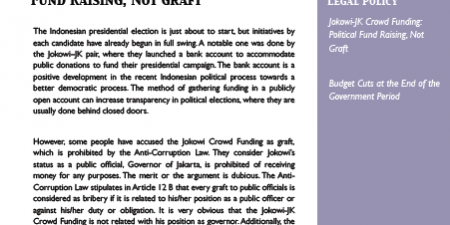Legal Policy
Jokowi-JK Crowd Funding: Political Fund Raising, Not Graft
The Indonesian presidential election is just about to start, but initiatives by each candidate have already begun in full swing. A notable one was done by the Jokowi–JK pair, where they launched a bank account to accommodate public donations to fund their presidential campaign. The bank account is a positive development in the recent Indonesian political process towards a better democratic process. The method of gathering funding in a publicly open account can increase transparency in political elections, where they are usually done behind closed doors.
However, some people have accused the Jokowi Crowd Funding as graft, which is prohibited by the Anti-Corruption Law. They consider Jokowi’s status as a public official, Governor of Jakarta, is prohibited of receiving money for any purposes. The merit or the argument is dubious. The Anti-Corruption Law stipulates in Article 12 B that every graft to public officials is considered as bribery if it is related to his/her position as a public officer or against his/her duty or obligation. It is very obvious that the Jokowi-JK Crowd Funding is not related with his position as governor. Additionally, the Presidential Election Law is encouraging contribution from the public at large in funding campaigns for the presidential bid. In Article 94 of the Law, it stipulates that the campaign fund can be received from, among others, the public (other parties -outside political parties and self-funding-). Moreover, the Law has also raised barriers for the campaign contribution, where individuals cannot contribute more than 1 million Rupiah and companies cannot donate more than 5 million Rupiah, with a clear identity of the contributors. (GAT)
Legal Policy
Budget Cuts at the End of the Government Period
The Government has issued Presidential Instruction No. 4 Tahun 2014 on Ministry/Agency Steps in Saving and Spending Cuts in the context of the Implementation of the State Budget for the 2014 Fiscal Year (Instruksi Presiden No. 4 Tahun 2014 tentang Langkah-Langkah Penghematan dan Pemotongan Belanja Kementerian/Lembaga dalam Rangka Pelaksanaan Anggaran Pendapatan dan Belanja Negara Tahun Anggaran 2014 / Inpres 4/2014). The instruction was established in order to control and secure the implementation of the 2014 State Budget. In his statement, the Minister of Finance, M.Chatib Basri, said that the Ministry.Agency budget cuts as much as 1 trillion Rupiah must be done so that the budget deficit does not exceed the set target of 2,5 percent of the Gross Domestic Product.
The amount of the Ministry/Agency budget cuts under the Presidential Decree differ from one another, with a total of 10 to 25 percent from their budget total. The largest cut was applied to the Ministry of Public Works; as much as 22,7 trillion Rupiah. On the other hand, there are also some parties which did not experience cuts at all, namely the Ministry of Education and Culture, the National Election Commission, and the Election Supervisory Board.
The policy of savings and budget cuts is receiving mixed reactions from different ministries/agencies. The majority of the ministries chose not to accept the policy without excessive response. However, several State Institutions have expressed their refusal through the media. The Judicial Commission is one example of a State Institution which refused the police by stating that they are constrained from fulfilling their obligations. One of the obligations in question is the selection of Supreme Justice candidates. This statement then received response from the Supreme Court, who also regrets the mentioned policy.
The pros and cons of the policy have not received a formal response from the House of Representatives, who also holds the Budgeting function. By viewing the consequences of the policy towards public interests, the House should take steps of prevention, such as requesting information from the Government, in order to minimize its effects. The active role of the House in this case is needed because the current media and public attention is also focusing mainly on the Presidential Election for the 2014—2019 period. It is because of this, the policy issue has potential to not be publicized optimally. (FN)

